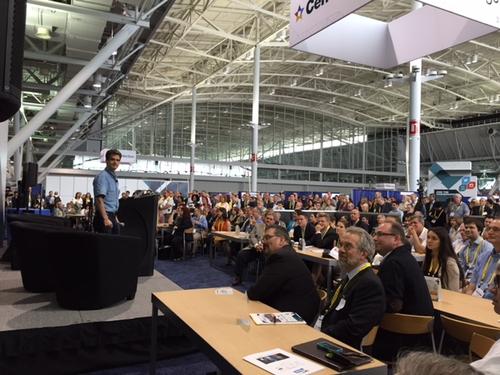If US industry could be given a grade for how it is cultivating today’s youngsters to become our next generations of engineers, a failing grade would be Dean Kamen’s assessment.
May 7, 2015
“C-.” If US industry could be given a grade for how it is cultivating today’s youngsters to become our next generations of engineers, a failing one would be Dean Kamen’s assessment. In a wide-ranging, uplifting, and at-times stinging keynote presentation on Wednesday at the MassMEDIC annual conference in Boston, co-located with Design & Manufacturing New England, a Design News event, the renowned inventor and entrepreneur urged a standing-room crowd to actively support STEM efforts, including his own FIRST foundation.
“If we (as a country) want to be more technically competent, there’s only one group of people who can make that happen, and that’s us,” Kamen said, referring to the engineers, manufacturers, medical device industry professionals, and technologists in the jam-packed audience. “Don’t whine about it,” he impassioned to the crowd about the engineering skills gap. “Do something about it.”
(Source: Design News/Jennifer Campbell)
FIRST (For Inspiration and Recognition in Science and Technology), the nonprofit charity Kamen founded, has been doing something about inspiring K-12 kids into STEM through its mentor-based programs and well-publicized team-based design competitions that are run like national sports leagues and NCAA tournaments. According to FIRST’s website, the effort delivered $20 million in college scholarships through 180-plus scholarship providers last year and in its 2014-15 season reached 400,000-plus students who competed in 38,700 teams. The championships took place in St. Louis in late April, in front of a crowd of 76,000 at Edward Jones Dome.
More than just plugging FIRST, Kamen revealed the secret behind its success while offering his critical view of the US’s struggle in getting kids interested in engineering, math, science, and technology. Rather than submitting to the popular view that America has an education crisis, he remarked that the country is suffering from a cultural crisis that puts sports and entertainment at the apex of youngsters’ lives. Looking at the popularity of the NBA, NFL, and Hollywood, Kamen told the capacity crowd, “We need to put STEM in an exciting, sports-like context, take sports and wrap it around technology,” he said. “Tech needs superstars like sports need their superstars. I need superstars to show how cool, fun, and accessible tech is.”
MORE FROM DESIGN NEWS: Video: Dean Kamen Discusses Developing a Prosthetic Arm for Wounded Vets
Kamen has successfully enlisted the likes of actor Morgan Freeman and pop star will.i.am to be FIRST activists, with the latter performing yearly at the FIRST Championship halftime show and reworking the lyrics of the song “Hall Of Fame” to be an anthem for STEM. Since George H.W. Bush’s presidency, FIRST championship teams have visited the White House every year – just like trophy-winning sports teams. “It’s not a science fair,” will.i.am has said before, “it’s a movement.”
Kamen, whose goal is to make FIRST accessible to every school in the US, urged industry professionals to become active role models and mentors in STEM programs. For his part, FIRST now is supported by 180,000-plus mentors and volunteers each competition season. At 30% of all participants, women and minorities have also been given a constructive outlet to discover self-confidence and the excitement and rewards of science and technology.
Kamen did not reserve his criticism to America’s STEM issues. He also chided a regulatory and political atmosphere that he says is working against innovation.
MORE FROM DESIGN NEWS: Dean Kamen: 'FDA Not to Blame for Stalling Medical Device Innovation'
“Tech is changing faster than policy and regulation; getting ‘stuff’ out is more challenging than ever,” Kamen noted. He said that industry, regulators, and political leaders have to come together to break an “adversarial” environment that is stymying ideas from becoming inventions. “Industry needs to have a louder voice to accomplish what we are trying to do,” he said.
In a presentation tinged with medical innovations that his DEKA Research laboratory in Manchester, N.H. has developed, as his keynote was part of Massachusetts Medtech Week, co-sponsored by MassMEDIC, Kamen showed video snippets of his next-generation peritoneal dialysis machine for in-home use. Kamen holds technology patents for portable dialysis machines.
He also showed, through video, an electromechanical prosthetic arm -- called the Luke Arm -- offering fine motor control for US soldiers who suffered physical losses in active duty. The 9-lb, FDA-approved arm can rotate at the elbow and wrist, hold an object as small as a raisin, and manipulate a grape without crushing it.
Also shown were DEKA’s portable water purification machine, which Kamen has worked with Coca-Cola and Bill Gates to get units into extremely poverished countries that lack potable water. It is powered by an electric generator that uses a Stirling engine.
Kamen might be best known for the Segway personal transporter, but for decades he has solved some of humanity’s physical and social ills. Before ending his keynote, in a bit of take-away inspiration for the awestruck designers and engineers, he declared, “I’m an inventor, and what do inventors do? We look at problems and solve them.”
And, in encouragement, he said, “Today,” because of the increasingly collaborative approach to innovation, “you can reach not just across [engineering] disciplines but also industries,” he said. “We all can raise the bar dramatically.”
Will Ng is a perfectionist who has been in business journalism for more than 15 years, many of which have been devoted to covering manufacturing, technology, and industry. A writer first, he loves to tell a good story and enjoys reporting on market trends and news.
About the Author(s)
You May Also Like




